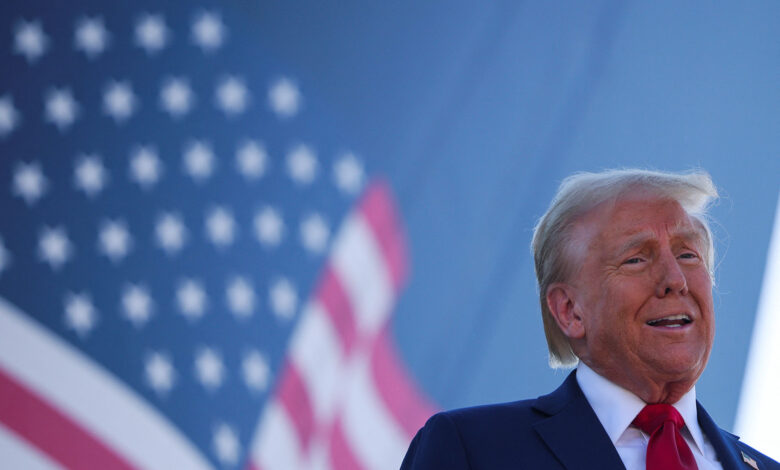Trump could scrap DOE, push school choice and boost education

On the campaign trail this month, former President Donald Trump has repeatedly vowed to “close the federal Department of Education” and expand school choice — a wildly popular concept that cuts across party lines, new polling shows.
Good news: If he wins the White House again, he can do both.
The federal Department of Education is an unconstitutional waste of time and money.
Its very existence arguably violates the Tenth Amendment: The word “education” appears nowhere in the Constitution.
The federal government has spent well over a trillion dollars on K-12 education since the department’s inception, while failing to improve student performance.
It was created in 1980, at the tail end of President Jimmy Carter’s single term in office, as a payoff to the nation’s largest teachers’ union after it endorsed his unsuccessful re-election bid.
Trump wants no part of it.
“I’m going to take the Department of Education, close it in Washington,” he said at a September rally in Pennsylvania.
“Let the states run their own education.”
He makes a good point.
The federal government could send the department’s budget back to the states so they can have more education funding to spend as they see fit.
That would allow for more local control — and less wasteful spending on useless bureaucrats in Washington.
But if Trump dismantled the federal education bureaucracy, could he also fulfill his separate commitment to unleash school choice?
Yes — and here’s how.
The Educational Choice for Children Act is a bill to set up a nationwide school-choice plan that would be neither run nor regulated by the federal Education Department.
During a Fox News interview on Friday, Trump said he would sign it.
As a federal tax-credit scholarship initiative, ECCA would allow taxpayers to keep more of their own money if they donate to K-12 scholarship programs in their states.
The idea is popular: A poll released this week found that 69% of American voters “support a federal tax credit that would allow parents to send their students to a school of their choice, including private schools,” according to The Center Square — including 62% of Democrats and 77% of Republicans.
And a bill to make that happen is already moving through Congress.
The House Ways and Means Committee passed ECCA last month along party lines, with all Republicans voting in favor and all Democrats in opposition.
It’s the first time in American history a nationwide school-choice initiative has advanced out of a congressional committee.
The bill creates a federal tax benefit for private donors to give to K-12 scholarship organizations.
Families can use the scholarships for private-school tuition, tutoring, special needs services, education technology and curriculum materials.
The idea isn’t unprecedented.
Twenty-one states already have school-choice programs in the form of tax-credit scholarships.
Florida, for example, launched its tax-credit scholarship initiative in 2001.
Now, nearly half a million students have been awarded scholarships through private school-choice programs in the Sunshine State.
Over the same period, Florida’s education system has climbed to the top of the national rankings — despite spending 27% less than the national average per student.
ECCA would benefit families in red states that already have school choice by giving them additional resources to make private education more affordable.
More importantly, it would give some form of school choice to families in blue states — end-running local lawmakers beholden to the teachers’ unions.
School choice is a rising tide that lifts all boats.
Nationwide, 26 of the 29 studies on the topic have found that school-choice competition improves outcomes in public schools, forcing them to up their game in response to the competition.
The next step is for the bill to advance to the House floor, where it has strong Republican support.
In fact, 153 GOP representatives — about 70% of the caucus — are already listed as cosponsors of ECCA.
And no wonder: School choice has become a GOP litmus-test issue after conservative parents in particular witnessed left-wing indoctrination in public schools during COVID-era remote learning.
The bill’s chance of success is unlikely in the Democrat-controlled Senate, although a majority of its voters support the concept — because the party is a subsidiary of the teachers’ unions.
Over 99% of campaign contributions from Randi Weingarten’s American Federation of Teachers went to Democrats last election cycle, as they have for decades.
Kamala Harris and Tim Walz are in lockstep with the unions: The 2024 Democratic Party Platform opposes school choice.
But with 31 Senate Republicans already signed on to ECCA and the GOP expected to take control of the chamber after November’s elections, nationwide school choice has a real shot at getting across the finish line in 2025 — if Republicans also hold the House and Donald Trump wins.
That kind of momentum would embolden them to send education back to the states for good by abolishing the federal Department of Education, too.
Corey DeAngelis is a senior fellow at the American Culture Project and author of “The Parent Revolution: Rescuing Your Kids from the Radicals Ruining Our Schools.”




